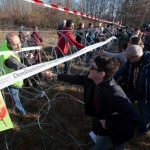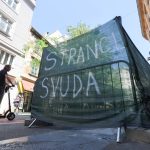Croatia did not face a large number of asylum requests – until now.
The number of migrants who sought international protection in Croatia last year increased by as much as 959 percent compared to a year ago. Last year, there were 2,235 asylum-seekers, while in 2015 there were only 211 such persons. And, according to last week’s report by Human Rights Watch (HRW), there were even more migrants who wanted to seek asylum in Croatia, but they were not allowed and were forcibly returned to Serbia, reports Večernji List on January 24, 2017.
Interior Ministry says that these claims are not true and that the report was composed on the basis of interviews with a dozen Afghan nationals, which is supposedly not relevant if one takes into account how many people has sought protection in Croatia.
Last year, the greatest number of international protection seekers came to Croatia from Afghanistan – 695. Afghanis were followed by people from Iraq (341), followed by Syrians (340), Pakistani (167) and Iranians (144). The right to receive protection in Croatia was granted to 37 people from Syria, 21 Iraqis, 7 Iranians, 6 Somalis…
Out of 2,235 asylum-seekers, asylum was granted to 83 people, while 16 people received the right to subsidiary protection in Croatia. Although both the asylum and subsidiary protection fall under the international protection category, the difference is in the rights which are granted. For example, an asylum seeker is entitled to a residence permit and a passport to be issued for a period of five years, while people under subsidiary protection get a passport for a period of two years and a residence permit for three years.
Since the beginning of this year, 30 applicants for international protection have been registered, with five people coming from Turkey, four from Syria, four from Iran, two from Iraq, two from Afghanistan, and the rest from other countries.
In its reply to HRW’s claims, the Interior Ministry said that Croatia was a candidate country for admission to the Schengen Area. “Interior Ministry is undertaking intensive preparations for the Schengen evaluation. Therefore, in addition to the harmonization of national legislation with the Schengen rules, we organize, independently and together with other bodies and organizations (UNHCR, for example), regular training for police officers on the subject of access to the system of international protection and the protection of fundamental human rights. Also, in November 2016, representatives of the Ombudsperson repeatedly visited the Croatian border police on the border with Serbia and have not found any significant irregularities”, announced the Ministry.









